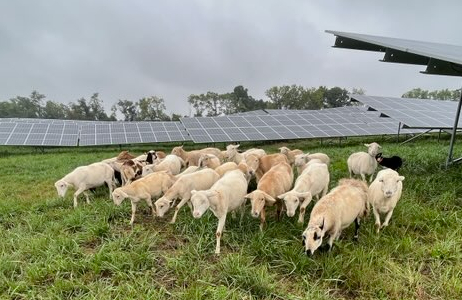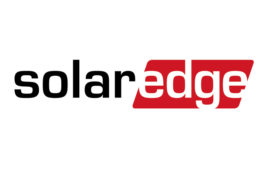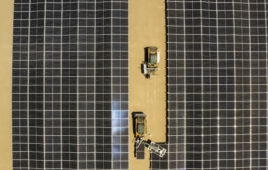Energy Support Services, a wholly owned O&M subsidiary of New Energy Equity, has worked out a vegetation management plan for a DSD Renewables project in Winchester, Virginia.
 The rocky terrain and exposed stone where a 1.8-MW ground-mounted solar project is located made mowing under the arrays impossible because of the risk of damaging the solar and mowing equipment. DSD contracted with Energy Support Services for a creative alternative to maintaining the seven-acre site at The Village at Orchard Ridge (TVOR), a Lutheran retirement community. The solution was to contract with Katahdin Acres, a member of the American Solar Grazing Association (ASGA), and employ sheep and pigs to manage the vegetation by grazing.
The rocky terrain and exposed stone where a 1.8-MW ground-mounted solar project is located made mowing under the arrays impossible because of the risk of damaging the solar and mowing equipment. DSD contracted with Energy Support Services for a creative alternative to maintaining the seven-acre site at The Village at Orchard Ridge (TVOR), a Lutheran retirement community. The solution was to contract with Katahdin Acres, a member of the American Solar Grazing Association (ASGA), and employ sheep and pigs to manage the vegetation by grazing.
“By using the solar grazing association’s directory and partnering with a local business, Katahdin Acres, the Winchester community is effectively working together to successfully generate renewable energy where it would otherwise be impossible,” said Conrad Gross, Energy Support Services’ General Manager. “We’re proud to have facilitated a solution that worked for both DSD and the retirement community to ensure the longevity and success of this solar array.”
Energy Support Services, DSD Renewables, and Katahdin Acres collaborated to address initial concerns from residents at the retirement community about the animals’ welfare, including what they would eat and drink, how they would shelter, and how they would be protected from wildlife. Katahdin Acres brought some of the kunekune pigs and sheep to The Village at Orchard Ridge for a “meet-and-greet” where the business’s experienced team also answered questions from residents.
“Having sheep and pigs help us maintain the grounds while giving them a safe place to freely roam is truly a win-win, and further demonstrates our collective commitment to deploying innovative solutions that reduce our projects’ carbon footprint in the communities we serve,” said David Eisenbud, Senior Director – Origination at DSD.
The vegetation management coordinated by Energy Support Services and DSD has already been successful, with lambs born this spring now enjoying the forage available on site. Maintenance costs of grazing are 60% of what it costs to mow the same acreage one time and the forage profile has improved from the initial weedy growth seen last year before the sheep and pigs arrived.
News item from Energy Support Services





Tell Us What You Think!